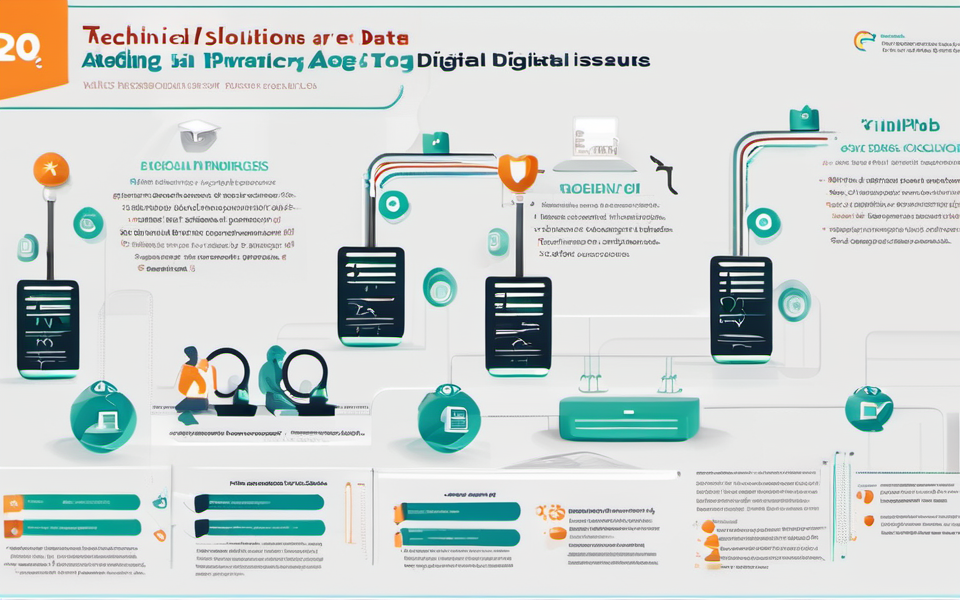Imagine a world where your every click, every search, every online move is tracked, analyzed, and used for purposes you never agreed to. Scary, right? That’s the reality of our hyper-connected digital age. But there’s hope. Cutting-edge technical solutions are rising to the challenge, creating a future where data privacy is not just a dream, but a reality.
The Growing Need for Data Privacy Solutions: A Crisis in Trust
Our personal information is the most valuable commodity in the digital age. Every interaction online, from browsing websites to using mobile apps, generates a wealth of data. While some data sharing is essential for a seamless user experience, the way this data is collected, stored, and used has become a major cause for concern.
The average user encounters a multitude of privacy issues:
- Data breaches and security risks: The alarming rise of data breaches, like the recent Equifax data breach, expose sensitive personal information to malicious actors, impacting individuals and businesses alike.
- Lack of transparency and control: Users often lack understanding about how their data is being collected and used. The terms and conditions are lengthy and often difficult to understand.
- Targeted advertising and profiling: Personalized advertising is increasingly reliant on complex algorithms and data analytics that build detailed user profiles, sometimes even predicting individual behaviors and preferences.
- Erosion of trust in online platforms: As companies increasingly rely on user data for profit, users become increasingly wary and distrustful, leading to a decline in engagement and confidence.
This escalating crisis demands robust and reliable data privacy solutions that address these issues.
Technical Solutions for Data Privacy: A New Dawn of Security
Technological innovation is at the forefront of protecting our digital identities. These solutions are not only tackling existing problems but also building a safer and more transparent digital future:
1. Data Minimization and Encryption
- Data minimization is the practice of collecting only the absolute minimum data required for a specific purpose, eliminating the storage and processing of unnecessary data points.
- Encryption adds an extra layer of security by transforming data into an unreadable format, protecting it from unauthorized access. Imagine locking a treasure chest with a robust combination. That’s encryption in a nutshell.
- Examples: Secure protocols like TLS/SSL ensure that sensitive information is protected during transmission.
2. Privacy-Enhancing Technologies (PETs)
These cutting-edge technologies empower individuals by giving them more control over their data. Think of them as tools that give you the power to decide what you share and how.
- Differential privacy: This technique adds random noise to data, making it difficult to identify individuals while still allowing meaningful insights to be drawn from the data.
- Homomorphic encryption: This advanced form of encryption enables computation on encrypted data, ensuring data privacy even during processing. Think of it as calculating the answer to a question without revealing the numbers involved.
- Federated learning: This technique trains AI models without directly sharing data. Data stays on the user’s device, only the learning model is shared, making it a secure approach.
- Zero-knowledge proofs: This technology allows users to prove they possess specific knowledge without revealing the knowledge itself. A great example is verifying your age without sharing your birthdate.
3. Privacy-focused Design and User-Centric Interface
- Designing data-minimization features: Streamlining signup processes, simplifying data collection forms, and limiting data retention policies create user-friendly and privacy-focused interfaces.
- Transparent and accessible data policies: Companies should proactively provide clear and easy-to-understand data policies, giving users more control and clarity.
- Enhanced data management features: Offering easy-to-use tools for data access, editing, and deletion empowers users and fosters trust.
Navigating the Future: Data Privacy as a Foundation
These technological solutions represent a critical step towards creating a data-driven world that respects privacy.
Here are key considerations for a privacy-centric future:
- Regulation and Compliance: Stricter data protection laws like the GDPR and the CCPA set the standard for responsible data handling and offer individuals greater rights over their data.
- Data Privacy as a Competitive Advantage: Companies that prioritize user privacy gain customer loyalty, build stronger brand reputation, and attract talented employees.
- A Shared Responsibility: Individuals, organizations, and governments must collaborate to promote a healthy and secure digital ecosystem.
The digital age demands responsible data handling. With the right technical solutions, a future where privacy reigns supreme is no longer a dream, but a realistic possibility. It’s a future where you have complete control over your digital identity, knowing your information is safe, secure, and used responsibly.
Key Takeaways:
- Data privacy is crucial in today’s digital world.
- Technical solutions are crucial in ensuring data privacy.
- Data minimization and encryption are fundamental principles of data privacy.
- PETs like differential privacy, homomorphic encryption, federated learning, and zero-knowledge proofs offer more advanced data protection.
- User-friendly interfaces, transparent policies, and robust data management tools are vital.
- Regulation, responsible data handling, and collaborative efforts are crucial for building a trustworthy digital future.









